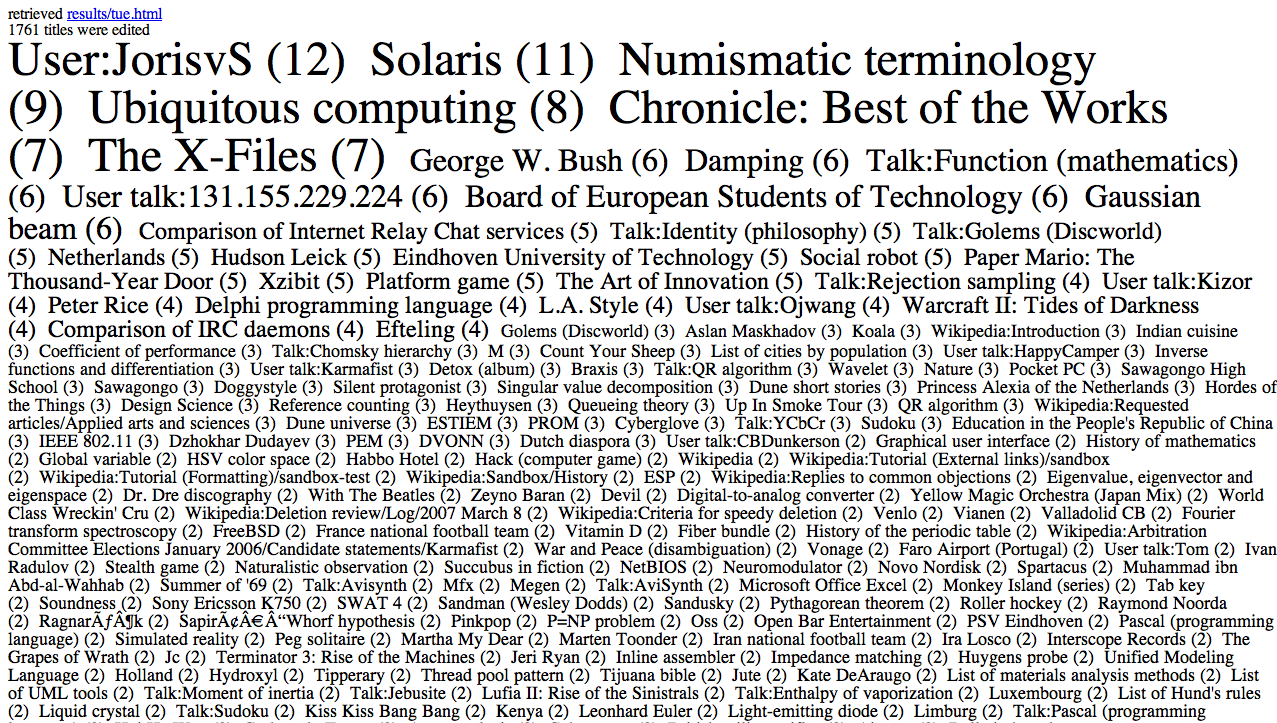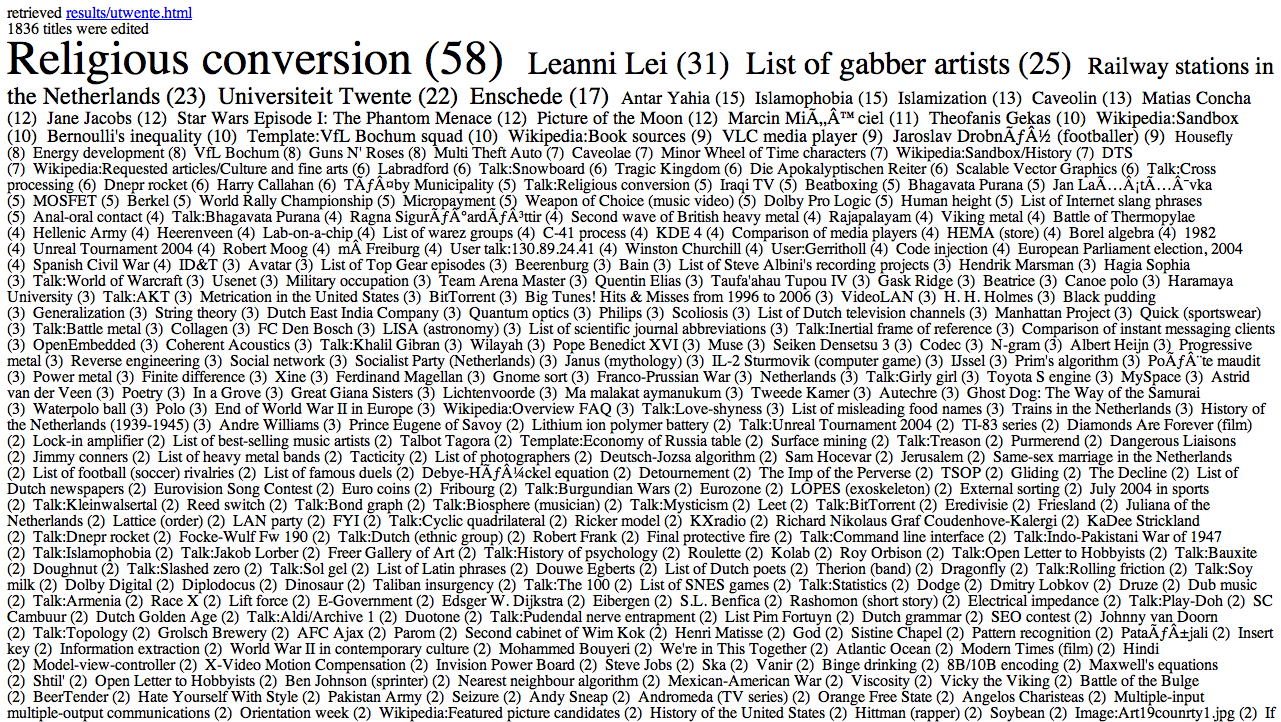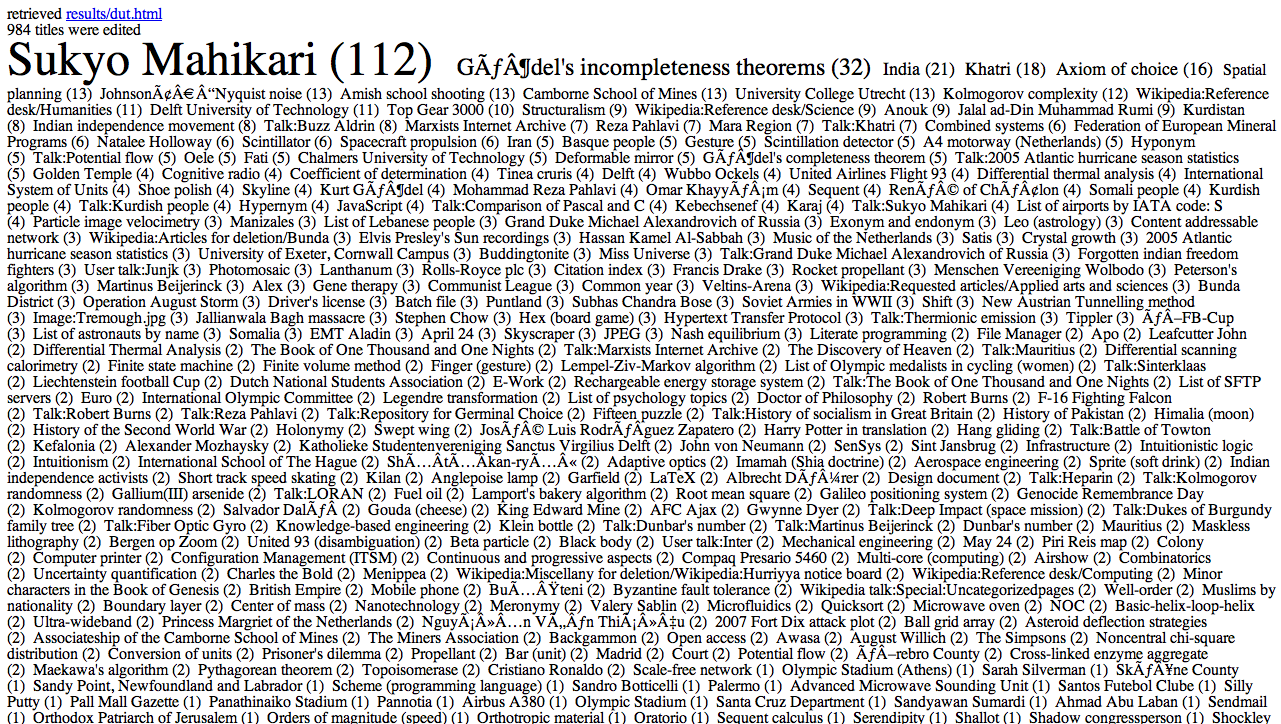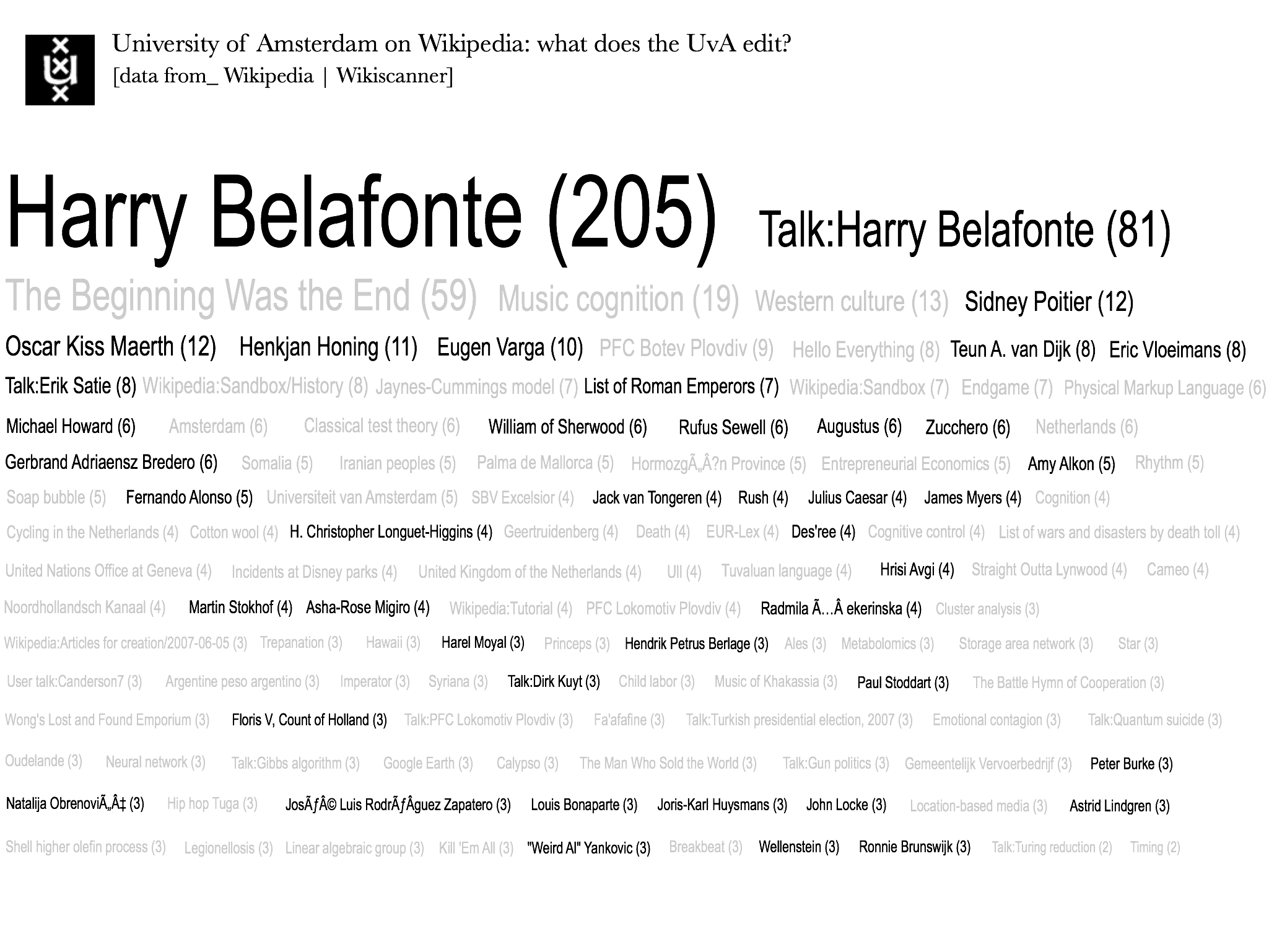You are here: Foswiki>Dmi Web>ProjectsOverview>WikiScanner>DutchUniversities (07 Oct 2007, michael)Edit Attach
Comparing Anonymous Wikipedia Production by Dutch Universities
Introduction
Every year, the Dutch weekly Elsevier conducts a large survey among students and professors, asking them to 'grade' the universities. The results are always highly anticipated, and a source of (somewhat) friendly competition. In addition to the ratings given by students and staff, the magazine looks at indicators of universities' relevance in terms of research. For instance the 2006 study produced the following ranked lists of universities based on the number of scientific publications: Universities (General)- University of Utrecht
- University of Amsterdam
- University of Groningen
- Free University of Amsterdam
- Radboud University Nijmegen
- Leiden University
- University of Tilburg
- Erasmus University Rotterdam
- University of Maastricht
- Technical University of Eindhoven (tied for 1st)
- Technical University of Delft (tied for 1st)
- University of Twente
Method
- Use Wikiscanner to find all anonymous Wikipedia edits by University IP addresses (NB: Wikiscanner uses a database of Wikipedia, and includes edits made between February 7th, 2002 and August 4th, 2007).
- Aggregate results; tabulate and visualize universities' edits.
Analysis
Overall Activity
Which universities (anonymously) contribute the most to Wikipedia? This table presents the universities' rank according to size (number of students + staff) alongside data depicting their anonymous activity on Wikipedia, including number of edits, the number of IP addresses used on Wikipedia and the number of articles edited. (Re-sort data by clicking on table headers.) Table: Anonymous Activity on Wikipedia per Dutch University| University | Rank according to size | Rank according to no. of edits | No. of anonymous edits | No. of articles edited | No. of individual IP addresses used to edit Wikipedia | Mean no. of edits per article | Mean no. of edits per individual IP address used on Wikipedia |
|---|---|---|---|---|---|---|---|
| University of Utrecht | 1 | 3 | 2641 | 1324 | 624 | 1.99 | 4.23 |
| University of Amsterdam | 2 | 6 | 1972 | 1031 | 558 | 1.91 | 3.53 |
| University of Groningen | 3 | 1 | 3002 | 2069 | 606 | 1.45 | 4.95 |
| Erasmus University Rotterdam | 4 | 12 | 432 | 224 | 104 | 1.93 | 4.15 |
| Leiden University | 5 | 5 | 1979 | 1176 | 462 | 1.68 | 4.28 |
| Radboud University Nijmegen | 6 | 8 | 1282 | 767 | 372 | 1.67 | 3.45 |
| Free University Amsterdam | 7 | 11 | 976 | 732 | 248 | 1.33 | 3.94 |
| Delft University Of Technology | 8 | 7 | 1785 | 984 | 467 | 1.81 | 3.82 |
| University of Tilburg | 9 | 13 | 302 | 161 | 116 | 1.88 | 2.60 |
| University of Maastricht | 10 | 9 | 1270 | 703 | 398 | 1.81 | 3.19 |
| Wageningen University and Research Centre | 11 | 10 | 1089 | 657 | 128 | 1.66 | 8.51 |
| University of Twente | 12 | 2 | 2840 | 1836 | 706 | 1.55 | 4.02 |
| Technical University of Eindhoven | 13 | 4 | 2143 | 1761 | 510 | 1.22 | 4.20 |
It has to be stressed that these results only depict anonymous activity on Wikipedia, so it is unlikely that this could be a representative sample for all Wikipedia edits through university IP addresses. Still, there are some interesting points to make:
- Taking into consideration the relative size of each university, the University of Twente and the Technical University of Eindhoven stand out as the most active on Wikipedia. There are two probable explanations. First, these both have U.S.-like 'campuses': students are more likely to spend time at the university and access the Web through university IPs. Second, these are technical universities, with possibly more affinity with new media, something that would have to be evidenced in the kind of articles edited (see below).
- The Erasmus University Rotterdam and the University of Tilburg are the least active, with the former being the standout 'underachiever' when taking size into consideration. This is also explained by the University environment. Erasmus is relatively isolated, and students are more likely to only be at the university for classes.
- The problem of distribution: when just a few IP addresses produce most of the edits, it could be supposed that a small number of active editors make up the majority of the university's contribution. For example, the Wageningen University and Research Centre has the highest number of edits per IP address, possibly pointing to a small group that is responsible for most of the university edits.
Comparison of Articles Edited
Do universities have clear topic preferences, and do these reflect broader research interests? For example, do technical universities (Twente, Eindhoven and Delft) stick to technical topics? Which universities focus on articles relating to the Netherlands, and which have the strongest 'international' presence? Here, just a few examples are given to illustrate the type of findings that come out of this research. Tag clouds for each university can be found here.Exporting Culture: Locating the Nation on Wikipedia
In an ongoing public debate on Dutch national identity, Princess Maxima noted that in her years in the Netherlands she has been unable to find one Dutch identity. Given this, she sides with a recent WRR report that argues that the term no longer be essentialized in policy-making (e.g. in 'citizenship classes' for immigrants). Has a constructivist view of identity gone mainstream? (Some politicians will disagree.) Taken together with the assumption that new, participatory media present the Dutch government with an opportunity to gauge the 'pulse' of the nation (1), the notion of identity performance may be explored further in the Dutch and English versions of Wikipedia (as well as on social networking sites, on forums, etc.) One way of approaching this question is to think in terms of representation. If the Netherlands is represented by articles on Dutch culture, what portion of those are produced by Dutch users? What Dutch articles are edited by different Dutch groups (in this case universities), and what are the levels of activity? Editors from more than one university were active on 120 articles dealing with Dutch language, culture, history and politics (list available here). These topics received a total of 768 anonymous edits, broken down by university below. 'Dutch' articles edited by just one university have not been included here due to time limitations:| University | No. of edits on local topics |
|---|---|
| Erasmus University Rotterdam | 44 |
| Delft University of Technology | 49 |
| Leiden University | 99 |
| University of Groningen | 101 |
| Radboud University Nijmegen | 50 |
| Technical University of Eindhoven | 30 |
| University of Maastricht | 29 |
| University of Tilburg | 10 |
| University of Twente | 66 |
| University of Utrecht | 124 |
| Free University Amsterdam | 26 |
| Wageningen University and Research Centre | 91 |
| University of Amsterdam | 49 |
- Judged on these data, Utrecht, Leiden and Groningen appear to be the most Dutch of Dutch universities. This might please Humanities professors, as they chose the Language and Culture programs from these three universities as the best in the Netherlands. (see the report by Elsevier (pdf)).
- Notable for their lack of presence on Dutch topics are the technical universities (Delft, Twente, Eindhoven) and the two Amsterdam universities.
- A closer look at the tag cloud reveals that the bulk of Wageningen's high number of edits were made on three articles related to Dutch culture: 'Ayaan Hirsi Ali', 'Wageningen' and 'Wageningen University'.
Wikipedia-profiling: Technical Universities and their Preferences
Can a university, or any other organization for that matter, be 'profiled' based on the Wikipedia articles it edits? On the Web, your behavior is presumed to reflect and predict what you might do online or elsewhere - Amazon's recommendations, and Google's personalized ads, remain instructive. Can university cultures be made visible on Wikipedia (or other platforms for user-generated content, such as Facebook and Myspace)? The following clouds are from the three Dutch technical universities: Technical University of Eindhoven
University of Twente

Delft University of Technology

Findings
- As could be expected, the three universities actively edit technical articles, though this is less so for the University of Twente. Twente is a special case, as it offers a couple of courses in the social sciences next to its main focus on technology, providing a plausible explanation for the difference.
- In addition to the technical topics, the universities' edits display a common interest in science fiction and games - the Top Geek award, however, really must go to the Technical University of Eindhoven, where the edits seem equally divided among physics, computing and online role-playing games. (The word 'geek' here is not an insult, and I wouldn't be studying new media if I were the type to look down on World of Warcraft. That said, I'm sure the students and staff in Eindhoven would agree that this tagcloud puts a clear stereotype on display.)
- Where the Technical University of Eindhoven sticks to science fiction, Twente and Delft have other identifiable interests. From Twente, a substantial number of anonymous edits were made to articles dealing with Islam and religion more generally, and trends in Delft's editing include Indian culture and history.
Star Gazing at the University of Amsterdam
Last but not least, I wanted to look at the anonymous edits made from the University of Amsterdam (UvA), where I attend. Originally, the plan was to test these against research programs or perceptions of the university in the press or otherwise (e.g. as left-wing). However, the data also presented another story: more than any of the other universities (no exact count was made, but it seems obvious from the clouds), the UvA edits biographies. A high proportion of these are of famous writers and (performing) artists: Harry Belafonte, Sidney Portier, Oscar Kiss Maerth, Rush, etc. Other 'great men' among the edits are historical figures (Julius Caesar and Augustus) and at least three current or former UvA professors. In the cloud below, emphasis has been added to make this overall trend more readily visible.
Conclusion
While the question has mostly been, 'what can the Wikiscanner tell us about Dutch universities?', the reverse is more interesting. What do the exercises carried out here say about the possible uses of the Wikiscanner for Wikipedia research? The Wikiscanner, with some tweaking, makes it possible to 'localize' Wikipedia activity by linking edits to specific institutions or within geographical borders. Such a move adds a dimension to studies of Wikipedia. Where these have had to hang on to notions of the 'virtual community' in describing the ins and outs of collaboration online, the kind of research hinted at here will make it possible to rethink this production as both a local and global operation. General assumptions about Wikipedia's 'U.S.-centrism' should be tested empirically, and alongside article content researchers should make use of location as a variable. In the case of universities, presumably hubs for the production of knowledge, this 'trick' is all the more interesting and relevant. But the Wikiscanner also comes with limitations. Only anonymous edits are indexed, meaning the samples are relatively small and, until one can prove otherwise, not representative of all edits. Also, despite any attempts here or elsewhere, it will be tough to disassociate 'anonymous' from 'discreditable'. With the profiles of technical universities, there is some indication that anonymous edits are representative, but this needs more work. Taking the Wikiscanner further will require adequately theorizing the 'anonymous edit'.Notes
1) This can be sensed in government initiatives to engage the e-citizen. According to the WRR, in making media policy for the digital age, "the foci of attention should be the functions that the media landscape is expected to fulfil in a democratic society. These include for instance independent news, debate and public opinion, education and culture. In the new media landscape, these functions will enable us, much more than technical media do, to search for and determine the public interests that demand and legitimate a role of government in the media landscape." Wetenschappelijk Raad voor het Regeringsbeleid (2005), "Media Policy for the Digital Age," Amsterdam University Press: 10, emphasis added. (Full report available here) _ Tags: , view all tags| I | Attachment | Action | Size | Date | Who | Comment |
|---|---|---|---|---|---|---|
| |
Articles_most_edited_by_all_Dutch_Universities_.png | manage | 127 K | 01 Oct 2007 - 17:18 | UnknownUser | Cloud: Articles with the most 'anonymous' edits by Dutch University IP addresses |
| |
Delft_University_of_Technology.png | manage | 311 K | 03 Oct 2007 - 09:37 | UnknownUser | Cloud: Delft University of Technology |
| |
Technical_University_Eindhoven.png | manage | 261 K | 04 Oct 2007 - 17:53 | UnknownUser | Cloud: Technical University of Eindhoven on Wikipedia |
| |
University_of_Amsterdam.png | manage | 306 K | 04 Oct 2007 - 11:03 | UnknownUser | Cloud: University of Amsterdam on Wikipedia |
| |
University_of_Amsterdam_on_Wikipedia.png | manage | 358 K | 04 Oct 2007 - 19:40 | UnknownUser | Cloud: University of Amsterdam on Wikipedia (emphasis added) |
| |
University_of_Twente.png | manage | 311 K | 04 Oct 2007 - 17:55 | UnknownUser | Cloud: University of Twente on Wikipedia |
Edit | Attach | Print version | History: r18 < r17 < r16 < r15 | Backlinks | View wiki text | Edit wiki text | More topic actions
Topic revision: r17 - 07 Oct 2007, michael
 Copyright © by the contributing authors. All material on this collaboration platform is the property of the contributing authors.
Copyright © by the contributing authors. All material on this collaboration platform is the property of the contributing authors. Ideas, requests, problems regarding Foswiki? Send feedback


